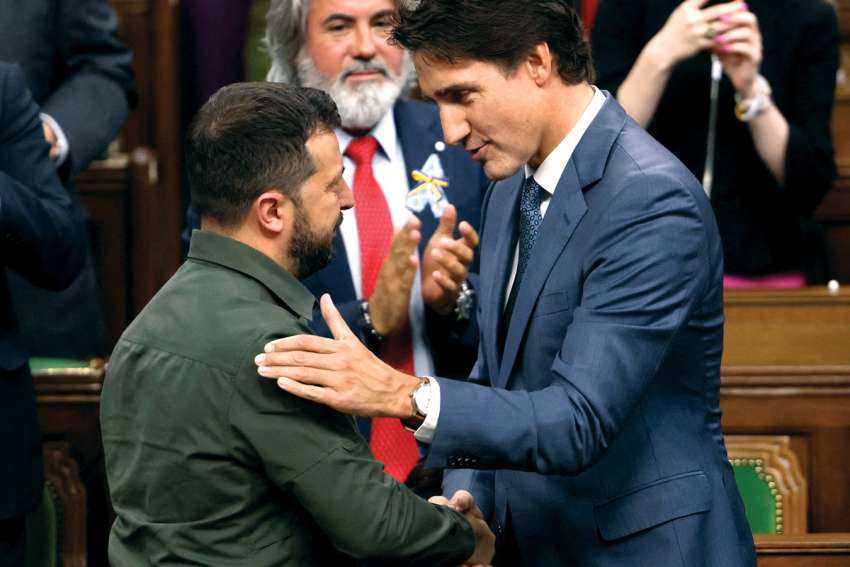Say nothing, the PM is said to have said to his MPs behind closed doors, and in two weeks it will all be forgotten. Say what you will about Trudeau II, he has an enviable understanding of the short attention span theatre that is current Canadian political life.
Last weekend, there he was standing steadfastly with Israel in the aftermath of the Hamas mass murders. Two weeks before, he was madly bobbing and weaving to duck blame for the two catastrophic standing ovations the House of Commons gave to a former Ukrainian Nazi soldier. Tempus fugits, does it not?
The rapid outburst then forgetting of the hubbub arising from that grotesquely gauche event, which coincided with the Day of Atonement on the Jewish calendar, proves how well the prime minister knows our amnesiac post-modern moment. It shows, too, how adroitly he can manipulate it. Meanwhile, it was the commentariat scolds who missed the point entirely by reproaching Trudeau and his MPs for their woeful historical ignorance
Canada’s political class isn’t devoid of history. No, it’s much worse. Its members are immersed in a particular counter-history that emerged just before they were born. They are the baptized children of hyper-relativist “narratives” whose “truth” shifts according to the position or trending momentum of the teller. Or in the words of a very fine historian with whom I studied recently: “We no longer speak of ‘truth’ when speaking of history.”
Previous generations held fast to William Faulkner’s immortal maxim in his novel Requiem for a Nun: “The past isn’t dead. It isn’t even past.” The Parliamentary debacle involving Jaroslav Hunka should have affirmed the immutable truth of those eight words. There, giving bodily form to the past as continuous present was a 98-year-old ex-Waffen SS warrior popping up in our Parliament 78 years after the end of the Second World War.
Yet Hunka was no nefarious interloper. He was invited by the Speaker of the Commons, now removed, as a signifier of the narrative of brave Ukrainians fighting heroically against the Russian Bear. The post-facto spinning around in ever diminishing circles about who overlooked the reality that he was fighting for the Nazis at the time obscured the authentic embarrassment: the exposed ingrained habit of “narrative” über alles.
Nazi-schmatzi. History-schmistory. Truth-schmook.
This was all about creating a vivid central image to embed in a transitory story the government wanted to project on the back of visiting Ukrainian President Volodymyr Zelensky — himself a theatrical narrative creation, albeit one of immensely admirable courage. It was about “shaping the discourse” of Trudeau and his Liberal government as vital, indeed heroic, players on the world stage. No worries about the truth of that since, well, in a narrative worshipping, memory-free era, there is no truth to tell, is there?
Alas, for once past facts presently got in the way of the good story. Hunka’s presence in the Commons visitor’s gallery became the embodiment of the argument historian Richard J. Evans made in his book In Defence of History a quarter century ago.
Evans took on and fought, let us say heroically, against post-modern “narrative” being granted unchallenged apex predator status in the academic, then cultural, then political worlds. He did not aim to eradicate the legacy of post-modernism the way non-historians such as Jordan Peterson now insist we must. He acknowledged the benefits of what had been a fresh way of thinking about historical problems. But he also cogently pressed the case that facts are, in fact, facts and therefore must be accounted for as truths standing against the whimsy of post-modern narrative.
“Auschwitz was not a discourse,” he wrote. “It trivializes mass murder to see it as a text. The gas chambers were not a piece of rhetoric.”
That was in 1997. Post-modernism has since grown a long beard and mutton chops. It’s old hat in the academy, as close as the amnesiac culture can remember to being accepted wisdom. In the hands of a shrewd political child of his time such as our current prime minister, however, it retains the psychological, even spiritual, power to soothe and confuse and, best of all, allow for infinite public shape-shifting.
“What? We have a Nazi in the rafters? In the immortal words of Donnie Brasco: Fuggedaboudit. Next year in Jerusalem!!”


